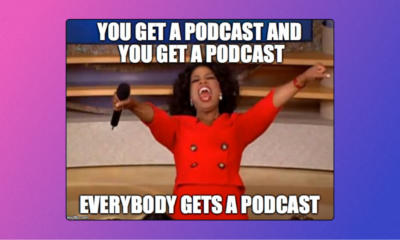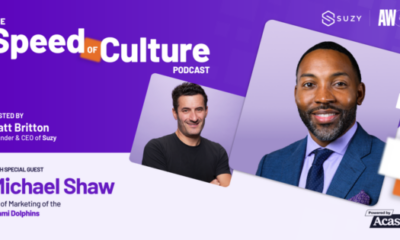The new app is called watchGPT and as I tipped off already, it gives you access to ChatGPT from your Apple Watch. Now the $10,000 question (or more accurately the $3.99 question, as that is the one-time cost of the app) is why having ChatGPT on your wrist is remotely necessary, so let’s dive into what exactly the app can do.
NEWS
I’ve Heard That: A Blog a Day Shows Google the Way

Speaker 1 (00:03):
Welcome to I’ve Heard That, the podcast from Hurrdat Marketing that discusses digital marketing trends, tips and more.
Meghan (00:11):
Hi and welcome everybody. I’m, again, excited to have you on the show, Ross. And Bailey, welcome. Bailey’s been on previous seasons, but welcome back Bailey. And we are going to unpack blogging. I know when I hear blogging, I think of travel blogs and personal blogs, recipes, home design tips. So break it down for me. It’s so much more than that now. And obviously we’re here to talk about it in a business context. So let’s back up. Tell me how did blogging come around? When did this start?
Bailey (00:47):
It seems like it’s been forever, but it really hasn’t been, it’s been 10, 15 years. I mean, if we go back to early days of the internet and… I don’t know about you Ross, but I had a Zanga and a live journal and things that we probably should never ever look up.
Meghan (01:06):
These probably still exist, right?
Ross (01:09): [crosstalk 00:01:09] and things like that. Altavista way back in the day. I’m a little older, so I’ve got a lot of skeletons in my closet.
Bailey (01:18):
That’s kind of where it started though, is just people journaling online. And then right around 2005 to about 2009, I’d say is the era of personal blogging. And that was where we started seeing everybody had a blog and they were just putting their thoughts out there. Some people were actually using it for, like you said, Megan, putting together recipes or sharing their travel stories, updates on their families, advice for other moms, things like that. And so it was really interesting because businesses and marketers saw the success of those blogs and said, “Hmm, we should do that.” And that’s kind of what led into, I’d say about 2010 to 2014, the content farming began. And that’s probably most noticeable with, I don’t know, Buzzfeed ever heard of them?
Bailey (02:13):
These businesses, these media companies, they were hiring writers and journalists, all of whom were struggling because of the recession. And they said, “Come produce content for us, produce just a lot of content.” And so it was so much quantity. There was just content everywhere and it was not good, it was so bad. It was a one to two minute read, lots of listicles, it’d be five tips, and none of the tips were substantial. Or it would be like, “Look at these gifts that I found from somewhere else on the internet.” And it was just kind of the wild west for a while. We started to see the tail end of that, where guest blogging became a thing where companies would invite people who were experts to come write for them. Sometimes they weren’t experts. Sometimes they were being paid, which is a no, no. We had also the Google Plus authorship era, which Ross, this is [inaudible 00:03:15]
Ross (03:14):
Yeah.
Bailey (03:19):
When poor Google Plus thought they were going to be a social media network and Google was actually trying to set its search engine result pages where, if you were a writer and you had your blog tied to your Google Plus account, you could actually show up above other accounts.
Ross (03:37):
[inaudible 00:03:37] your picture.Bailey (03:38):
With your picture.
Ross (03:40):
The short lived period where your author biography, your picture would appear right next to the article. It was a scary time.
Bailey (03:48):
And then that went away almost immediately, which is [inaudible 00:03:52]. But then we got into this 2014 to 2018 ish period, which I think we could all agree is kind of the early days of the strategic SEO content writing. That was when we really saw Google started to release a bunch of algorithm updates that were pushing for high quality content. And they said like, “We’re not going to play the games we’ve been doing for the last couple years. We need you to actually produce stuff that people want to read and that provides value.” And so that’s where keyword research started becoming a big thing. People had been doing that longer than 2014, but the tools really started coming out and the methods and the tactics started to getting shared. And it was also a time when we saw keyword stuffing quite a bit, which-
Meghan (04:44): [inaudible 00:04:44].
Bailey (04:44):
It’s like, “Put home organization in there 400 times it’s a 500 word post, but sh, its fine”. And so that’s kind of what has led us into the current period, which I like to think of this as the Google dominion phase. You know how when people talk about like, how do you define art? And they’re like, well, they decide. Google is the they. Google says, this is content. This is bad content. And it’s where we’ve seen a lot of really like strategic content marketing happening through blog content. You’re seeing people invest in audience analysis and competitor research, keyword research and implementation. Topical authority. Because that’s now a big thing with Google where they’re like, stay in your lane and only talk about the things that matter to your business. Don’t just come up with random content. And we’re also seeing topic clusters and like really these big kind of guides and resources being built out. And Ross, I know that’s something that you focus on a lot here too.
Ross (05:53):
Yeah, definitely. I’m just going back to a point you made about the algorithm updates kind of like a 2014, 2015, there was two major ones called Penguin and Panda that were literally looking at content and links. And they were obviously intrinsically linked together, especially with the guest posts and the guest blogging that you mentioned. And that was a really kind of a key phase for content and looking at how people were kind of gaming the system. So you were writing that guest post and putting specific links back to your content that might not have been contextually sound, that what you were linking to had nothing to do with what you were writing about. But at that point in time, it was working and there was no penalties for it, even though there was no contextual linking between what you were writing about and what you were linking to, it was still a tactic that worked.
Bailey (06:50):
They were like, there’s a link. Okay.
Ross (06:50):
Exactly. So that was really prevalent in the early teens. But with the advent of those two algorithm updates, that put an end to it pretty much overnight, if you had a whole blog network of links that were linking to your site that were not contextual, you were falling foul of the algorithm update. And similarly, if you had thin content, if you were writing those five point listicles that Bailey mentioned that basically had nothing in it, other than five bullet points, Google didn’t like it, you were going to fall out of the search. So it was really a key moment when those two algorithm updates converged, and it really forced people to actually rethink everything they were doing content wise because what was happening then couldn’t continue. You had to really reevaluate and really start to dial in exactly what you were writing about and start to become those topic authorities and write about what was your area of expertise and then gain those links naturally to that content instead of building them unnaturally by linking through guest post and guest blogs, et cetera.
Meghan (08:00):
Yeah. I think it’s shifted dramatically from the like, how can I game the system, where like, no, how can you educate your audience or like engage them or provide them of something of value. That’s what’s going to rank well for you or that’s what’s going to bring the relevant audience to your site.
Ross (08:15):
Yeah. And it was kind of a shift from writing for the search engines to writing for the end user, because at that point you were writing. So as Bailey mentioned, like the keyword stuffing, you were writing for the search engine, because you wanted your post to show up for those keywords. So you were stuffing it with those keywords, thinking that Google would see it and think, okay, well this has got 50 mentions of home organizations. So I’m going to rank you at number two. And that just did not work. It didn’t fly. So having to like refocus what you were writing on, how you approached it and who your target audience actually was, was a lot more focused post those algorithm updates because you had to actually write for the user intent, you had to write for what people were looking for, not what you thought the search engines were looking for.
Ross (09:00):
So it was a fundamental shift in kind of thoughts and thought patterns and how you went around your keyword research and your topic research. You couldn’t just churn out a whole slew of articles on basically nothing and then get links that way, you had to target it. You had to write supplementary content around your main thoughts and ideas so you just didn’t have one post, you would write 10 posts, all about the similar topics that you were writing about, just so that you could try and convince the search engines that you actually were an authority on this topic. And you knew what you were talking about it. So they could then give back to you by ranking your posts higher in the search.
Meghan (09:39):
Which actually makes sense. Hey Google, thank you. So one of my favorite myths for you guys to squash out for our listeners is, keyword research is dead, then you’re saying, I don’t need to do keyword research, right?
Ross (09:53):
No.
Bailey (09:53):
Very much still need it, because that’s the thing is, where we are now is, it’s a better blend of trying to appease the search engine and also trying to appease the humans. More so the humans, because obviously if you’re a business and you’re blogging, like the end goal is to get more customers, the search engine doesn’t buy stuff from you. So they are literally just a channel for you to reach your customers. And so we have to approach all of the content that we put together for blogs, with that in mind. We need to understand how the search engine works and how the algorithms display our content, so that way we can get in the places we need to be, but we’re ultimately trying to provide good resources, good answers for people who are searching for those answers and those resources.
Meghan (10:43):
Yeah. Well, I mean times have changed. I look at how COVID has been like groundhogs day for me, but both Burt being within the last year, like Google’s understanding what we’re saying. So the keyword research isn’t so much like, Hey, I’m going to use this keyword and then variations of it, like home organization, how to home organize, like all of these variations. Google’s like, yeah, yeah, yeah. We know it means the same thing, but what are you talking about and its ability to assess the context around these keywords and the overall context of the article for ranking versus just how many times did you say this keyword.
Ross (11:20):
Yeah. And Google’s been very open in saying they’re using machine learning and AI as an underpinning of their search engine results pages. It’s kind of servicing the queries, but it’s kind of looking at it and how it can best show the answers for that query by using machine learning. So having kind of a broader approach to the keyword research and the content writing kind of helps in that. And it kind of gives you that semantic understanding. It’s not just one particular keyword, it’s more of a keyword theme, a topic that you’re writing about instead of trying to attain that specific keyword.
Meghan (12:02):
Yeah, definitely. So give me some examples, who is blogging bus for now? Not everyone needs a blog.
Bailey (12:12):
No. Yeah. We run into this a lot with clients, they’ll come to us and say like, Hey, I think I should have a blog. And the first thing we want to do is, okay, why? Like, are you thinking about blogging in terms of like the 2010 blogging, because that’s usually what it is. And we’re like, we don’t do that. That’s old stuff, old news, but we want to look at their goals a lot of times. So, if someone comes to us and says, I’m trying to get more foot traffic to my small local business, blogging’s probably not going to help there. Not directly. You might want to invest that money into local business listings. But if a company comes to us and says, I want to drive more website traffic, I want to push my competitors down in search engine results pages. I want to be an authority on this subject or I want to get out some good PR about my business. These are things that blogging can help with.
Bailey (13:14):
A blog can do so many different things. It could be your brand awareness channel. It could be kind of like your resources for your customers. It could be literally just a SEO strategy for you. So it kind of depends on what people need. It’s not a one size fits all solution. You know, if you have like a water treatment facility and you’re like, I need blogging. I don’t think you do. Now if you’re a retailer, hmm. Maybe. Maybe, what do you sell?
Meghan (13:53):
Or a [inaudible 00:13:54], like you mentioned that use case too. So we’re going to help you learn how to fully leverage our tool and we’re going to do it like throughout these articles or as a resource center to help you troubleshoot or how to help you maximize this. Yeah, there’s all kinds of use cases for that. Awesome. So this can be used in many different ways to incorporated into a marketing strategy, where do some businesses start? How do they incorporate blogging into a solid marketing strategy?
Bailey (14:23):
I think there are kind of three major outcomes you would look at with this, where one would be your brand awareness. So that’s really just like, I am blogging to get my company’s name out there because whatever product or service I have is not something that people need every day. It might be something they only need once a year or couple times a month, and you want to make sure that you’re getting in front of those people and just kind of planting that little seed in their head of like, oh, this is a good business. They know what they’re talking about. So then when they do need that service or that product, you’re the first one they think of. So that’s kind of where a lot of people use their blog is like recruiting, company news, just kind of high level, Here’s what we do type of articles.
Bailey (15:16):
And so that’s always a good route to go. Then there’s kind of more of like the resource type where it’s essentially like a way to convince people to choose your business. Let’s say you’re a bank, for example, and I’m a customer and I’m looking for a mortgage lender. If I go to your website and I’m looking at your services and I’m like, well, this website looks like every other bank I’ve checked out. You know, what’s the difference? What more can they offer me? But then I see that you have a really good blog that has like financial advice for me and tips for how I can get out of debt or how I can save up for like retirement or things like that. That could be a convincing tool for me. That could say like, huh, the competitors don’t have that information. This bank knows what they’re talking about. I feel like maybe like if I do business with them, then they can be a good resource for me.
Bailey (16:09):
And then the kind of last one, this one is not as common, more common with like retailers, but this would be where you can actually use blogging for direct purchases. So think about things like wire cutter, where you can have sales happening within the blog post, you can put together a list of like, here is the hottest fall trends for fashion, or here are the best hiking boots. And if you sell those products, you can literally list them with a purchase this product button and get a direct conversion from that post. So there’s quite a wide range of ways you can use blogging. And then of course, I mean, all of these ones are part of an SEO strategy because they can all help your name and your website get into Google search results more often.
Ross (17:03):
Yeah. And a lot of these different posts actually align themselves nicely with different search features that you can try and attain for. So think about like a how to post. You’ve got a how to use the certain product or how to like build a vegetable garden, a raised bed or something like that. You could actually list out those steps one by one in a blog post and mark them up with schema or how to schema. And those steps could actually appear in the search. Again, pushing down competitors, putting your brand in front of people and giving you more real estate the search engine. Similarly with like FAQs, you can miss those out. So people can have frequently asked questions and you can type that into the search. And you could be there. You could literally be there with your answer in the search themselves without them having to go to your page.
Ross (17:50):
And if they want more, then the link is there for [inaudible 00:17:52] they click through to go to that page to see more. So you can use these blog posts as a holistic strategy. You can get more than just eyes and visibility on the website itself. You can actually get your brand and your visibility in the search. So people see it like directly in front of them when they’re doing the search, they don’t have to get to your website to see your brand or to see your answer. You can get that directly in the search.
Meghan (18:17):
Yeah. Not to mention voice search because that’s where a lot of these long tell queries, the questions are being pulled from, they’re being answered by like frequently asked questions or snippets, or like someone’s actual answer. And when Google or Alexa, whoever’s reading it back to you, they’re only reading one answer. So it’s coming from hopefully your blog.
Ross (18:38):
Exactly.
Bailey (18:39):
And Google’s getting so much smarter about finding very specific passages within content as well that it will pull out like an answer from. So even if your post covers a wide range of subjects, if you have a very specific answer to something, that could get pulled up into that voice search answer. And so, if you’re not targeting those questions, you’re not like actively doing the research to see, what do people want answers to? What do they want to read? Then blogging is not for you. You need to do that. You need to do it.
Meghan (19:16):
Well. Yeah. Google is so super smart. One of the examples I use, it actually comes from personal experience, last week I was looking for, I think my query was temperature for pork. I wanted to know like, how do I not get food poisoning? Like how warm does this need to be? And obviously the other answer that it was like, did you want to know how hot the grill is? It answered it correctly for me. It was like, Hey, don’t quote me on this. You’ll get food poisoning. It gave me the actual answer for like how high my thermometer needed to get. But it was like that question, I get it, is not very specific. And so Google was like, but if you didn’t mean that, like here’s some other articles. And then you can go down the rabbit hole. You’re like, oh, that’s helpful. Oh, that’s helpful. Like, there’s a lot of opportunity to answer specific questions.
Ross (20:02):
And I think that’s a good time to mention that having all these search features is a great thing, but it can also be a negative thing as well. So it’s good to be aware of that. Although it doesn’t necessarily affect your strategy. Google is kind of moving to a zero click strategy where it’s trying to give you the answers instantly right there right then. And we see that with the feature snippets and some of these search features I mentioned, like the FAQs, it’s trying to give you that answer without having to leave Google. It’s trying to keep you in its environment. But with that said, it also gives you an avenue to get those people to your website as well at the same time. So it is worth mentioning that it can lead to a zero click moment. Like yours was how it gave you the temperature. You didn’t have to go any further, but the links are there for people to go further if you want to, but it can lead to some queries that get the direct answer rather than showing your response there and then driving that traffic to the website.
Bailey (21:09):
Even still, that could be a very, very great brand awareness tool, even if like someone’s not clicking through, but you constantly have the answers to their questions and they see that and they see your brand name in search engine results because of the content you’ve created on your blog. Like that can be huge. Just that’s very convincing. It’s like, oh wow, that one website, they really know what they’re talking about. I might go check him out.
Meghan (21:37):
So blogging can be really intensive. It can be really strategic. I know we’ve touched on AI for example, but back to the basics, like coming out of the deep end, where do business owners start? How can we help them create a strategy that’s manageable?
Bailey (21:53):
Yeah. So obviously what Ross and I are talking about here, like Megan mentioned, is getting way into the deep end, because those are things we think about as part of our jobs, but whether you’re doing this on your own or you’re working with an agency to create a content strategy for your blog, the first thing is, like I said, you kind of need to identify that, what are you trying to do? What’s your goal? Drive traffic, get brand awareness, convince people to buy stuff, whatever it is, understand that first. Then, what you want to do is kind of set like a theme or find kind of like some easy topic areas that you can cover as an authority. And just kind of outline those, say like, Hey, we could have a whole sector of just this content and then we could have this and this.
Bailey (22:44):
And after you’ve outlined that, then it comes to setting kind of a calendar. This might be a monthly post, a bimonthly, a weekly, a biweekly, daily, however much content you think you can reasonably produce, which is another thing people always struggle with. I always say, start with the like highest level, start monthly. And then you can work up from there. Just kind of set that as a pattern and make sure you also have some channels in mind for where you can promote this. Do you have social media accounts where you can share this content? Do you have a YouTube channel where you could essentially repurpose this same content and get vlogs out there? And then something else I would think about too is like, how are you actually structuring your posts? We know that there are some SEO best practices for content for blogging, definitely have titles that include some type of valuable keyword.
Bailey (23:45):
That’s really important. Do fill out SEO metadata as well. I know Ross is like, Ugh, when they don’t do that, why? And if you don’t know what SEO metadata is, all that is just the title and the little description that shows up in Google search results. So there are plenty of tools that can be plugged into the back end of websites that allow you to fill out that information whenever you’re putting together a blog post. They renamed it. Now I’m going to say the wrong name, but it’s SEO Yoast for WordPress.
Ross (24:18):
Still the name right now. They just got bought out. But it’s still the right name.
Bailey (24:23):
Still the name for now. So whenever you’re listening to this, hopefully that’s still the name. Otherwise I sound terrible. [crosstalk 00:24:31] but definitely fill that out. Use quality images, whether it’s stock or something that you have for your business itself. Have images, include videos where you can answer questions and make sure you have a post that’s longer than 250 words. Nobody wants to read something that sure, that could have been a text.
Ross (24:54):
Yeah. And also think about, what other ways can you kind of repurpose this content? Can it be a list? Can it be FAQs? Can it be a little bit more interesting than just a few paragraphs of text? How can you break it up to make it a little bit more interesting?
Meghan (25:10):
Yeah. All super helpful. And again, yeah, blogging doesn’t have to be this unreachable, must have writers on hand to execute. It can be starting as small as you said, like planning a monthly post. You’re the expert share your knowledge. Awesome. Well, thanks again for joining us today, Ross and Bailey. It’s awesome to have you on the show again.
Ross (25:32):
Thank you.
Meghan (25:32):
Remember to like, rate, review and subscribe. Our new episodes come out every other Wednesday. So we’re excited to have you back. Thank you.
Ross (25:41):
Thanks.
Speaker 1 (25:43):
I’ve heard that is a part of the Hurrdat media network. From our information, follow Hurrdat on Facebook, LinkedIn, Twitter or Instagram, or visit [email protected]
Speaker 5 (25:52):
A Hurrdat media production.
Source: Hurrdat
Facebook Faces Yet Another Outage: Platform Encounters Technical Issues Again

Uppdated: It seems that today’s issues with Facebook haven’t affected as many users as the last time. A smaller group of people appears to be impacted this time around, which is a relief compared to the larger incident before. Nevertheless, it’s still frustrating for those affected, and hopefully, the issues will be resolved soon by the Facebook team.
Facebook had another problem today (March 20, 2024). According to Downdetector, a website that shows when other websites are not working, many people had trouble using Facebook.
This isn’t the first time Facebook has had issues. Just a little while ago, there was another problem that stopped people from using the site. Today, when people tried to use Facebook, it didn’t work like it should. People couldn’t see their friends’ posts, and sometimes the website wouldn’t even load.
Downdetector, which watches out for problems on websites, showed that lots of people were having trouble with Facebook. People from all over the world said they couldn’t use the site, and they were not happy about it.
When websites like Facebook have problems, it affects a lot of people. It’s not just about not being able to see posts or chat with friends. It can also impact businesses that use Facebook to reach customers.
Since Facebook owns Messenger and Instagram, the problems with Facebook also meant that people had trouble using these apps. It made the situation even more frustrating for many users, who rely on these apps to stay connected with others.
During this recent problem, one thing is obvious: the internet is always changing, and even big websites like Facebook can have problems. While people wait for Facebook to fix the issue, it shows us how easily things online can go wrong. It’s a good reminder that we should have backup plans for staying connected online, just in case something like this happens again.
NEWS
We asked ChatGPT what will be Google (GOOG) stock price for 2030

Investors who have invested in Alphabet Inc. (NASDAQ: GOOG) stock have reaped significant benefits from the company’s robust financial performance over the last five years. Google’s dominance in the online advertising market has been a key driver of the company’s consistent revenue growth and impressive profit margins.
In addition, Google has expanded its operations into related fields such as cloud computing and artificial intelligence. These areas show great promise as future growth drivers, making them increasingly attractive to investors. Notably, Alphabet’s stock price has been rising due to investor interest in the company’s recent initiatives in the fast-developing field of artificial intelligence (AI), adding generative AI features to Gmail and Google Docs.
However, when it comes to predicting the future pricing of a corporation like Google, there are many factors to consider. With this in mind, Finbold turned to the artificial intelligence tool ChatGPT to suggest a likely pricing range for GOOG stock by 2030. Although the tool was unable to give a definitive price range, it did note the following:
“Over the long term, Google has a track record of strong financial performance and has shown an ability to adapt to changing market conditions. As such, it’s reasonable to expect that Google’s stock price may continue to appreciate over time.”
GOOG stock price prediction
While attempting to estimate the price range of future transactions, it is essential to consider a variety of measures in addition to the AI chat tool, which includes deep learning algorithms and stock market experts.
Finbold collected forecasts provided by CoinPriceForecast, a finance prediction tool that utilizes machine self-learning technology, to anticipate Google stock price by the end of 2030 to compare with ChatGPT’s projection.
According to the most recent long-term estimate, which Finbold obtained on March 20, the price of Google will rise beyond $200 in 2030 and touch $247 by the end of the year, which would indicate a 141% gain from today to the end of the year.
Google has been assigned a recommendation of ‘strong buy’ by the majority of analysts working on Wall Street for a more near-term time frame. Significantly, 36 analysts of the 48 have recommended a “strong buy,” while seven people have advocated a “buy.” The remaining five analysts had given a ‘hold’ rating.

The average price projection for Alphabet stock over the last three months has been $125.32; this objective represents a 22.31% upside from its current price. It’s interesting to note that the maximum price forecast for the next year is $160, representing a gain of 56.16% from the stock’s current price of $102.46.
While the outlook for Google stock may be positive, it’s important to keep in mind that some potential challenges and risks could impact its performance, including competition from ChatGPT itself, which could affect Google’s price.
Disclaimer: The content on this site should not be considered investment advice. Investing is speculative. When investing, your capital is at risk.
NEWS
This Apple Watch app brings ChatGPT to your wrist — here’s why you want it

ChatGPT feels like it is everywhere at the moment; the AI-powered tool is rapidly starting to feel like internet connected home devices where you are left wondering if your flower pot really needed Bluetooth. However, after hearing about a new Apple Watch app that brings ChatGPT to your favorite wrist computer, I’m actually convinced this one is worth checking out.
-

 PPC4 days ago
PPC4 days ago19 Best SEO Tools in 2024 (For Every Use Case)
-

 PPC7 days ago
PPC7 days ago4 New Google Ads Performance Max Updates: What You Need to Know
-

 MARKETING7 days ago
MARKETING7 days agoWill Google Buy HubSpot? | Content Marketing Institute
-
SEARCHENGINES6 days ago
Daily Search Forum Recap: April 16, 2024
-

 SEO6 days ago
SEO6 days agoGoogle Clarifies Vacation Rental Structured Data
-

 MARKETING6 days ago
MARKETING6 days agoStreamlining Processes for Increased Efficiency and Results
-
SEARCHENGINES5 days ago
Daily Search Forum Recap: April 17, 2024
-

 PPC7 days ago
PPC7 days agoHow to Collect & Use Customer Data the Right (& Ethical) Way










![The State Of SEO 2024: Disruptions And Opportunities [Podcast] The State Of SEO 2024: Disruptions And Opportunities [Podcast]](https://articles.entireweb.com/wp-content/uploads/2023/08/The-State-Of-SEO-2024-Disruptions-And-Opportunities-Podcast-400x240.jpg)
![The State Of SEO 2024: Disruptions And Opportunities [Podcast] The State Of SEO 2024: Disruptions And Opportunities [Podcast]](https://articles.entireweb.com/wp-content/uploads/2023/08/The-State-Of-SEO-2024-Disruptions-And-Opportunities-Podcast-80x80.jpg)




You must be logged in to post a comment Login